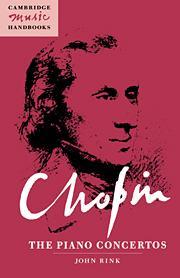1 - Contexts
Published online by Cambridge University Press: 18 December 2009
Summary
The early nineteenth-century piano concerto
The fundamental upheavals in politics and culture that rocked Europe during the late eighteenth and early nineteenth centuries radically altered musical practice and the institutions that supported it. New instrumental and vocal genres, a burgeoning concert and operatic industry, and an entire class of ‘professional performers’ rapidly evolved alongside countless music-publishing and instrument-building ventures, all aiming to satisfy the demands of a bourgeoisie revelling in its recently acquired power as patrons of the arts. The piano was at the heart of this expanding musical world, especially in Vienna, which boasted eminent figures like Mozart, Beethoven, Ries, Hummel and Moscheles, and, later, in Paris, to which dozens of keyboard virtuosos flocked each year ‘like swarms of locusts’, in Heine's memorable phrase. Continual advances in piano design and construction enabled keyboardists to attain new heights of technical brilliance on both the lighter Viennese and the more sonorous English pianos, and sparkle and dexterity were further enhanced by Erard's double escapement action, patented in 1821. Such improvements also facilitated the piano's penetration into the middle-class home, providing composer–pianists with sizeable amateur markets demanding tailormade pieces or simplifications of the virtuoso tours de force heard in the concert hall.
By the time Paris had established itself in the 1830s as ‘capital of the nineteenth century’,keyboard virtuosity and the operatic stage completely dominated professional music-making, much to the chagrin of critics like Schumann, who lamented the damage thus inflicted on ‘serious’ compositional activity. But even he recognised the charm and appeal of the best virtuoso music, not all of which is the cliché-ridden, meretricious claptrap habitually derided by scholars.
- Type
- Chapter
- Information
- Chopin: The Piano Concertos , pp. 1 - 11Publisher: Cambridge University PressPrint publication year: 1997



